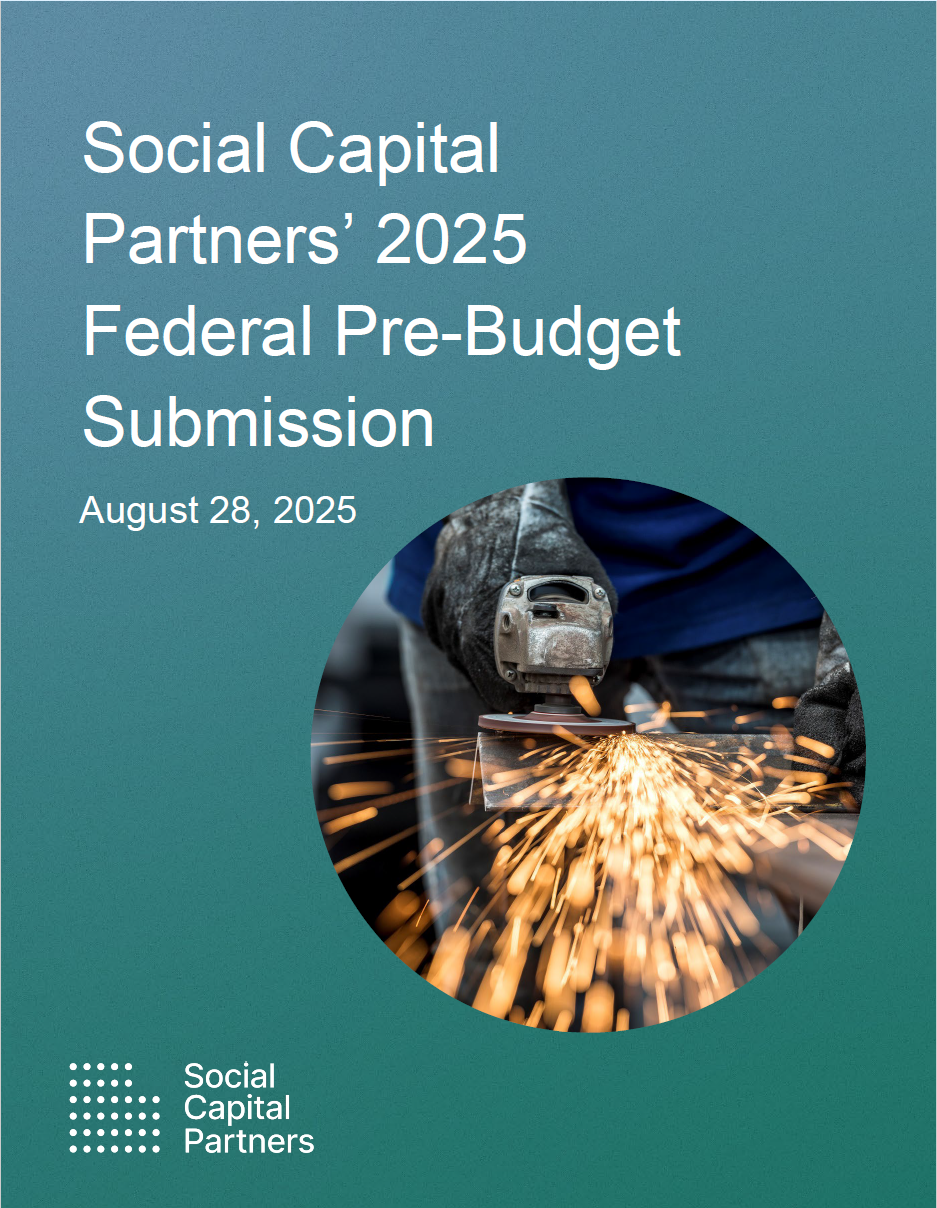Canada needs an ownership agenda in the face of an unprecedented challenge to Canada’s economy from the American administration and the collapse of the global security and economic order
There has never been a federal budget quite like this one. Canada faces a moment of extreme peril, threatened by an American administration that has abandoned our mutually beneficial trading and security regime.
We cannot know whether the American people and their democratic institutions will be powerful enough to resist the attacks waged upon them by their own government. But this budget is a time to outline how the government will use all available policy and fiscal tools to address our own economic vulnerabilities in the face of this unprecedented assault on the well-being of Canadians.
There is broad consensus that Canada’s new approach to the economy and national security must be governed by a historic pivot away from dependence on the United States to rebuild our own sovereignty and deepen our economic and security partnerships with like-minded democracies around the world.
Canadians have given the federal government the benefit of the doubt to implement a policy agenda that delivers economic growth and builds the strongest economy in the G7. At Social Capital Partners, we strongly believe that the interests of working people and young people must be centred in the economic growth agenda. The global evidence is overwhelming: policy choices that prioritize economic growth alone, without attention to the distributional impacts of that growth, leave countries weaker, societies more unstable and lead to plutocracy.
The Budget should prioritize catalyzing investments that will provide more people and communities with an equity stake in the wealth being created in Canada, which will, in turn, give working Canadians and young people a reason to believe in the future, in Canada and in the promise of democratic capitalism.
What problems must the government address?
At Social Capital Partners, we begin with a simple observation: the benefits from growth over the past few decades have been captured by capital, contributing to extreme wealth inequality, economic insecurity and high barriers to intergenerational mobility. The deepening inequality documented in our Billionaire Blindspot report has created despair for many and, in other countries, has led to the collapse of democracy and the rise of political violence. Addressing the increasingly bumpy road to wealth building, home ownership and economic security facing most young Canadians must be core to Canada’s economic growth agenda.
Too many of our assets are owned by too few and too much of our economy is owned by those with little connection to Canada. Investors are accumulating and inflating the value of our businesses, resources and assets, enriching themselves and leaving more Canadians economically insecure and vulnerable.
The government’s signature initiatives thus far deliver on its campaign commitments to cut taxes and lower regulatory burdens to promote economic growth. We strongly believe that the government should add to its current economic growth agenda by introducing a suite of measures to catalyze investments that will lead to broadly based, widely distributed Canadian ownership of our businesses, resources and assets. Inequality undermines our unity at a time when Canadian unity is our greatest strength in the face of a larger, more powerful neighbour.
The government’s first steps towards fulfilling an inclusive ownership agenda
At Social Capital Partners, we advocate for an overarching strategic orientation that will: increase Canadian ownership of Canadian assets and improve access to wealth and ownership for young people, workers, communities, Indigenous peoples and independent entrepreneurs. Economic sovereignty and ownership of our own assets should be front and centre in the growth agenda at budget time.
We commend the government for already taking some steps to advance more distributed ownership and catalyze new investment in diverse communities:
- $10 billion in loan guarantees to enable Indigenous communities to maintain equity in resource extraction and other major projects.
- The Black Entrepreneurship Loan Fund to get low-cost capital to entrepreneurs who have faced barriers to accessing capital.
- The partnership between First Nations Bank and BDC to facilitate the acquisition of existing businesses by Indigenous communities.
- The capitalization of the community finance ecosystem through the Social Finance Fund.
- The establishment of the Large Enterprise Tariff Loan facility at CDEV to take strategic equity stakes in Canadian companies.
- Investments in food security and innovation through FCC Capital.
- The selection of independent fund managers for the Canada Growth Fund.
- The landmark Employee Ownership Trust legislation, making it easier for workers to become owners of the businesses they help build.
These are the kinds of creative policy and program solutions that are delivering real results – inclusive economic growth, broadly distributed ownership of assets and widespread equity for Canadians, workers and communities.
The ownership solution
As a next step, Social Capital Partners recommends the Budget focus on broadening ownership to ensure the benefits of economic growth are more widely shared. With a huge number of Canadian businesses about to change hands, now is the time to ensure Canadians retain ownership of our own assets and a new generation of Canadians have access to pathways to wealth-building and economic security.
Our policy recommendations come with no or little fiscal cost but will generate economic growth and deliver returns over the medium term. They will catalyze investment in Canadian communities without undertaking new program spending. They require strategic, active state leadership and deploy creative and concessionary financing tools, like loan guarantees.
They speak to the challenges we are facing and the opportunities open to Canadians: create pathways to business ownership for a new generation of Canadian entrepreneurs, employees, communities and not-for-profits; make available more affordable, accessible financing to empower communities to own more of their own assets, strengthen their local economic resilience and build community wealth; and catalyze investment to retain Canadian strategic assets for the benefit of Canadians.
Enhanced and distributed ownership delivers many benefits at this moment: greater sovereignty, strong local community economies, inclusive economic growth and democratic stability.
We recommend the government build on its current economic growth agenda and:
1. Prioritize a coordinated suite of initiatives focused on enabling succession opportunities for Canadian business owners, entrepreneurs, social purpose organizations and communities.
It should be much easier and less risky for younger Canadians and local organizations to buy existing businesses from older owners. 76% of Canadian business owners plan to exit within the next decade, representing $2 trillion in business assets, yet fewer than 10% have a formal succession plan. The government should unleash a wave of business transitions from retiring owners to independent and aspiring Canadian entrepreneurs. Programs to support entrepreneurship tend to prioritize the development of net-new businesses, rather than facilitating transitions of ownership to local, independent and innovative entrepreneurs. The government can address this through changes to the Small Business Financing Program to mirror the successful American 7(a) loan program and by launching a focused “Buy a Business” program through BDC that offers low-cost capital. The government should also use loan guarantees and co-investment to facilitate the acquisition of small- and medium-sized businesses by employees, co-ops, communities and other alternative ownership structures. In a time of decreased housing affordability and rising youth unemployment, buying a business can be one realistic path for young Canadians to build wealth and put their talent to work in securing their future.
2. Enable the growth of robust and accredited Community Investment Institutions.
There are many existing community-responsive financing institutions working across Canada to support local economic investment, development and resilience. By formalizing, accrediting and capitalizing them, the federal government can better support this crucial sector. More formal recognition of this sector would catalyze additional investment opportunities. For example, loan guarantees could be extended to accredited community investment institutions, amendments to the Income Tax Act could be made to designate accredited institutions as qualified donees to unlock more philanthropic investment and tax credits could be offered for local investment. By making small investments in community investment institutions, the federal government can leverage significant new investment in local economies and local and community ownership of businesses.
3. Create a sovereign fund to invest in and acquire vulnerable or strategic Canadian businesses in key sectors.
Many Canadian businesses are facing pressure to relocate or sell to foreign investors. Others require patient capital to remain liquid and re-tool for new markets. The federal government should invest in a new fund that would buy or invest in existing firms that run into trouble or are critical to our economic sovereignty. The federal government should guarantee a benchmark rate of return for pension funds to catalyze additional investment in the fund. Independent and local news media should be one priority, given that sovereign and democratic control of the news media is one buffer against the attacks on Canadian democracy and our capacity for democratic self-government.
4. We strongly endorse the recommendations from Employee Ownership Canada on how to strengthen the existing Employee Ownership Trust (EOT) legislation.
EOTs ensure more Canadian workers can secure an equity stake in the companies they helped build. It can truly be a great time to be a worker in Canada if there are pathways to ownership. EOTs provide a way for owners to sell to their employees and keep companies Canadian, keep jobs in local communities and build wealth for workers. Employee-owned companies have proven to have higher productivity, be more resilient during economic shocks and build and retain more wealth in local communities. As advocated by both Employee Ownership Canada and the CFIB, the EOT tax incentive should be made permanent and reviewed for effectiveness at an appropriate time (e.g. after five years).
Our public financial institutions and crown corporations (including CDEV, EDC, BDC, FCC, FNFA and the CIB) all have nation-building roles to play in this work. Likewise, the federal government should mandate, incentivize and de-risk investments from pension funds, philanthropic foundations and endowments so they increase their investments in a more sovereign Canadian economy where more people can find pathways to build wealth, ownership and economic security.
It is important that the federal government track and report on key ownership metrics. The evidence is overwhelming that communities with more local ownership outperform their peers on economic growth, employment growth and poverty reduction. One study from the Canadian Federation of Independent Business finds that 66 cents of every dollar spent at a locally owned business recirculates in the local economy, while only 11 cents spent at a global chain does – and only eight cents spent through an online American tech platform.
Canadians are ready to rise to the challenge
If our economy is broadly owned by Canadians, we will be more resilient in the face of whatever threats come our way in the future. Economic growth alone will not be enough to save us from the demons looking to push successful democracies like Canada into the abyss. We need to use all the financing and policy levers at our disposal to reclaim ownership of our economy, reassert agency over our future, give young people and working people pathways to economic security and never again find ourselves vulnerable to the whims of imperialist powers.
None of those making and shaping public policy is fully prepared for this moment. However, it is clear that many of the assumptions that have guided our economic and policy thinking for decades no longer apply. We must try things we would have dismissed last year.
Canadians can choose what emerges from this transformational time. The democratic world is resisting the attempt by authoritarian powers to push the world further towards inequality and plutocracy.
Policy choices in this budget need to move us away from an economy fueled by wealth extraction that enriches billionaires and inflates the bottom lines of foreign funds, and instead, move us towards more local reinvestment that builds an inclusive, sustainable and resilient democratic future where all Canadians have realistic chances to build economic security.
Share with a friend
Related reading
Elbows up: A practical program for Canadian sovereignty | Report
Canada can’t become a sovereign country by doing the same old things, explains a new compendium of essays co-sponsored by the CCPA, the Centre for Future Work and several national civil society organizations. Elbows Up: A Practical Program for Canadian Sovereignty is a response to corporate rallying cries responding to Donald Trump with a familiar playbook: deregulation, austerity, tax cuts and fossil fuel expansion. The collection includes contributions from 20 progressive economists and policy experts, including SCP CEO Matthew Mendelsohn and others who participated in the Elbows Up Economic Summit held in September 2025 in Ottawa.
Pipelines and algorithms aren’t going to save us | The Hill Times
Smart investments in natural resources and AI alone will not get us through this moment of geopolitical rupture. As Matthew Mendelsohn writes in an op-ed for The Hill Times, SMEs contribute just over half of Canada’s GDP and employ 64 per cent of our people. We have to make more low-cost capital available to the smaller businesses, locally owned enterprises, not-for-profits and social enterprises who crucially employ and reinvest locally, act as important local economic infrastructure and provide services that are crucial for well-being. They are automatic stabilizers in the face of tariff threats outside our control.
What’s wrong with mainstream economics?
Mainstream, or “neoclassical,” economics still dominates how we teach, study and understand our economy, even though much of it doesn’t match reality. In this piece, economists Louis-Philippe Rochon and Guillaume Vallet explain why outdated economic ideas persist and how they can lead to harmful policies. They challenge five common myths about inflation, growth and inequality, showing that today’s economy is driven more by power and institutions than by perfect markets. As "heterodox" economists, they argue it's time for a new kind of economics that reflects how the real world actually works.



